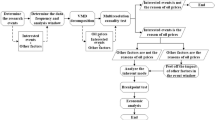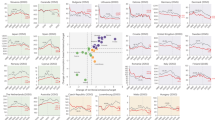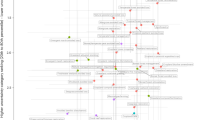Abstract
The credibility of carbon offset mechanisms is threatened by many issues related to their true effectiveness. We advocate that these issues cannot be effectively addressed without a dramatic improvement in transparency across the entire value chain of carbon offsetting, a crucial step for achieving a reduction in carbon emissions.
This is a preview of subscription content, access via your institution
Access options
Access Nature and 54 other Nature Portfolio journals
Get Nature+, our best-value online-access subscription
$29.99 / 30 days
cancel any time
Subscribe to this journal
Receive 12 digital issues and online access to articles
$119.00 per year
only $9.92 per issue
Buy this article
- Purchase on Springer Link
- Instant access to full article PDF
Prices may be subject to local taxes which are calculated during checkout

Similar content being viewed by others
References
So, I. S., Haya, B. K. & Elias, M. Voluntary Registry Offsets Database (Berkeley Carbon Trading Project, 2023).
The Voluntary Carbon Market: 2022 Insights and Trends (BCG and Shell, 2023); https://www.shell.com/shellenergy/othersolutions/carbonmarketreports.html
Final Report (Taskforce on Scaling Voluntary Carbon Markets, 2021); https://www.iif.com/Portals/1/Files/TSVCM_Report.pdf
Blake, H. The great cash-for-carbon hustle. The New Yorker (16 October 2023); https://www.newyorker.com/magazine/2023/10/23/the-great-cash-for-carbon-hustle
Greenfield, P. Revealed: more than 90% of rainforest carbon offsets by biggest certifier are worthless, analysis shows. The Guardian (18 January 2023).
Long-Term Carbon Offsets Outlook 2023 (Bloomberg, 2023); https://spotlight.bloomberg.com/story/longtermcarbonoffsetsoutlook2023/
CBL, an Xpansiv Market (Xpansive, 2023); https://xpansiv.com/cbl/
The Art of Integrity SOVCM 2022 Q3 (Ecosystem Marketplace, 2023); https://www.ecosystemmarketplace.com/carbon-markets/
Childs, M. & de Zyla, P. A Dangerous Distraction—The Offsetting Con (Friends of the Earth, 2021); https://policy.friendsoftheearth.uk/download/dangerous-distraction-offsetting-con
Martins, D. Carbon Markets are a Threat to the Amazon (Greenpeace, 2023); https://www.greenpeace.org/international/story/61342/carbon-markets-are-a-threat-to-the-amazon/
Balmford, A. et al. Credit credibility threatens forests. Science 380, 466–467 (2023).
Krishnan, R., Hidalgo, S. J. & Fuchs, M. The problem with carbon offsets. Stanf. Soc. Innov. Rev. 21, 38–44 (2023).
Trouwloon, D., Streck, C., Chagas, T. & Martinus, G. Understanding the use of carbon credits by companies: a review of the defining elements of corporate climate claims. Glob. Chall. 7, 2200158 (2023).
Michaelowa, A., Hermwille, L., Obergassel, W. & Butzengeiger, S. Additionality revisited: guarding the integrity of market mechanisms under the Paris Agreement. Clim. Policy 19, 1211–1224 (2019).
Michaelowa, A. et al. International carbon markets for carbon dioxide removal. PLoS Clim. 2, e0000118 (2023).
Wunder, S. Revisiting the concept of payments for environmental services. Ecol. Econ. 117, 234–243 (2015).
Probst, B., Toetzke, M., Anadon, L. D., Kontoleon, A. & Hoffmann, V. Systematic review of the actual emissions reductions of carbon offset projects across all major sectors. Preprint at Research Square https://doi.org/10.21203/rs.3.rs-3149652/v1 (2023).
Delacote, P., Le Velly, G. & Simonet, G. Revisiting the location bias and additionality of REDD+ projects: the role of project proponents status and certification. Res. Energy Econ. 67, 101277 (2022).
Guizar-Coutiño, A., Jones, J. P. G., Balmford, A., Carmenta, R. & Coomes, D. A. A global evaluation of the effectiveness of voluntary REDD+ projects at reducing deforestation and degradation in the moist tropics. Conserv. Biol. 36, e13970 (2022).
West, T. A. P., Börner, J., Sills, E. O. & Kontoleon, A. Overstated carbon emission reductions from voluntary REDD+ projects in the Brazilian Amazon. Proc. Natl Acad. Sci. USA 117, 24188–24194 (2020).
West, T. A. P. et al. Action needed to make carbon offsets from forest conservation work for climate change mitigation. Science 381, 873–877 (2023).
Groom, B., Palmer, C. & Sileci, L. Carbon emissions reductions from Indonesia’s REDD+ moratorium are cost-effective yet contribute little to Paris commitments. Proc. Natl Acad. Sci. USA 119, e2102613119 (2022).
Badgley, G. et al. California’s forest carbon offsets buffer pool is severely undercapitalized. Front. For. Glob. Change 5, 154 (2022).
Gill-Wiehl, A., Kammen, D. M. & Haya, B. K. Pervasive over-crediting from cookstove offset methodologies. Nat. Sustain. https://doi.org/10.1038/s41893-023-01259-6 (2024).
Dutschke, M. & Angelsen, A. in Moving Ahead with REDD: Issues, Options and Implications (ed. Angelsen, A.) 77–86 (CIFOR, 2008).
Honegger, M. et al. The ABC of governance principles for carbon dioxide removal policy. Front. Clim. 4, 884163 (2022).
Simonet, G., Subervie, J., Ezzine‐de‐Blas, D., Cromberg, M. & Duchelle, A. E. Effectiveness of a REDD+ project in reducing deforestation in the Brazilian Amazon. Am. J. Agric. Econ. 101, 211–229 (2019).
Carrilho, C. D., Demarchi, G., Duchelle, A. E., Wunder, S. & Morsello, C. Permanence of avoided deforestation in a Transamazon REDD+ project (Pará, Brazil). Ecol. Econ. 201, 107568 (2022).
Delacote, P., Robinson, E. J. & Roussel, S. Deforestation, leakage and avoided deforestation policies: a spatial analysis. Res. Energy Econ. 45, 192–210 (2016).
Filewod, B. & McCarney, G. Avoiding carbon leakage from nature-based offsets by design. One Earth 6, 790–802 (2023).
Haya, B. K. et al. Quality Assessment of REDD+ Carbon Credit Projects (Berkeley Carbon Trading Project, 2023); https://gspp.berkeley.edu/research-and-impact/centers/cepp/projects/berkeley-carbon-trading-project/redd
Murray, B. C., McCarl, B. A. & Lee, H. C. Estimating leakage from forest carbon sequestration programs. Land Econ. 80, 109–124 (2004).
Haya, B. K. et al. Comprehensive review of carbon quantification by improved forest management offset protocols. Front. For. Glob. Change 6, 958879 (2023).
Delbeke, J., Marro, E. & Vis, P. Towards an EU Policy Agenda for Voluntary Carbon Markets (European Univ. Institute, 2023).
Lou, J., Hultman, N., Patwardhan, A. & Qiu, Y. L. Integrating sustainability into climate finance by quantifying the co-benefits and market impact of carbon projects. Commun. Earth Environ. 3, 137 (2022).
Simonet, G., Delacote, P. & Robert, N. On managing co-benefits in REDD+ projects. Int. J. Agric. Res. Gov. Ecol. 12, 170–188 (2016).
Asiyanbi, A. P. A political ecology of REDD+: property rights, militarised protectionism, and carbonised exclusion in cross river. Geoforum 77, 146–156 (2016).
Ehrenstein, V. The friction of the mundane: on the problematic marketization of the carbon stored by trees in the tropics. J. Cult. Econ. 11, 404–419 (2018).
Greenfield, P., Hawkins, A. & Ganguly, M. BP and Spotify bought carbon credits at risk of link to forced Uyghur labor in China. The Guardian (13 November 2023).
Nantongo, M., Vatn, A. & Soka, G. REDD+: he perfect marriage between conservation and development? A comparative study of the impacts of REDD+ on livelihoods and deforestation in Tanzania. World Dev. 173, 106432 (2024).
Schmalensee, R. & Stavins, R. N. The design of environmental markets: what have we learned from experience with cap and trade? Oxf. Rev. Econ. Policy 33, 572–588 (2017).
Bottega, L., Brécard, D. & Delacote, P. Advertising, ecolabeling and consumers’ beliefs: greenwashing or not? Econ. Lett. https://doi.org/10.1016/j.econlet.2023.111513 (2024).
Secretive Intermediaries: Are Carbon Markets Really Financing Climate Action? (Carbon Market Watch, 2023); https://carbonmarketwatch.org/publications/
Voluntary Carbon Markets Discussion Paper (IOSCO, 2022).
Tedersoo, L. et al. Towards a co‐crediting system for carbon and biodiversity. Plants People Planet https://doi.org/10.1002/ppp3.10405 (2023).
Dooley, K. et al. The Land Gap Report (Climate Resource, 2022); https://www.landgap.org/
Akerlof, G. A. The market for ‘lemons’: quality uncertainty and the market mechanism. Q. J. Econ. 84, 488–500 (1970).
Groom, B. & Venmans, F. The social value of offsets. Nature 619, 768–773 (2023).
Sills, E. O. et al. Building the evidence base for REDD+: study design and methods for evaluating the impacts of conservation interventions on local well-being. Glob. Environ. Change 43, 148–160 (2017).
Schneider, L. et al. Double counting and the Paris Agreement rulebook. Science 366, 180–183 (2019).
Marchant, G. E., Cooper, Z. & Gough-Stone, P. J. Bringing technological transparency to tenebrous markets: the case for using blockchain to validate carbon credit trading markets. Nat. Res. J. 62, 159 (2022).
Kreibich, N. & Hermwille, L. Caught in between: credibility and feasibility of the voluntary carbon market post-2020. Clim. Policy 21, 939–957 (2021).
Wawrzynowicz, I., Krey, M. & Samaniego, X. Assessing and Comparing Carbon Credit Rating Agencies (Carbon Market Watch, 2023); https://carbonmarketwatch.org/publications/assessing-and-comparing-carbon-credit-rating-agencies/
Bakhtary, H., Tierney, M., Galt, H. & Gill-Wiehl, A. More Than Just a Carbon Project: How Clean Cooking Projects Certified Under the Gold Standard Approach SDG Claims (Climate Focus and Modern Energy Cooking Services, 2023); www.mecs.org.uk
Empowering Consumers for the Green Transition P9_TA(2023)0201 (European Parliament, 2023).
Comment informer les consommateurs des conditions de rémunération des producteurs agricoles? Rapport n°22042 (CGAAER, 2022).
Jones, J. P. & Lewis, S. L. Forest carbon offsets are failing. Science 381, 830–831 (2023).
Skidmore, C. Mission Zero: Independent Review of Net Zero (UK Government, 2022); https://assets.publishing.service.gov.uk/government/uploads/system/uploads/attachment_data/file/1128689/mission-zero-independent-review.pdf
Natzler, B. et al. Voluntary Carbon Markets and Offsetting (Climate Change Committee, 2022); https://www.theccc.org.uk/wp-content/uploads/2022/10/Voluntary-carbon-markets-and-offsetting-Final.pdf
Proposal for a Regulation Establishing a Union Certification Framework for Carbon Removals COM (2022) 672 final (European Commission, 2022).
Decreto-Lei n.º4/2024, de 5 de janeiro Diário da República, Série I, n.º 4/2024 (Presidência do Conselho de Ministros, Ambiente e Ação Climática, 2024).
Voluntary Carbon Markets (IOSCO, 2022).
2022 ISDA Verified Carbon Credit Transactions Definitions (ISDA, 2022).
CFTC Division of Enforcement Creates Two New Task Forces Press Release No. 8736-23: (CFTC, 2023).
CFTC Whistleblower Office Issues Alert Seeking Tips Relating to Carbon Markets Misconduct Press Release No. 8723-23 (CFTC, 2023).
The Enhancement and Standardization of Climate-Related Disclosures for Investors Rel. No. 33-11042; 34-94478 (proposal) (SEC, 2022).
Corporate Sustainability Reporting Directive (CSRD) Directive 2022/2464/EU (European Parliament. 2022).
Voluntary Carbon Market Disclosures Bill No. 1305 (California Assembly, 2023).
Green Guide on Environmentally Friendly Products (FTC, 2012).
Advertising Guidance: Misleading Environmental Claims and Social Responsibility (ASA, 2023).
Direction Générale de l’Energie et du Climat (DGEC) Étude comparée des standards de compensation existants (Ministère de la Transition énergétique and Icare, 2022).
Acknowledgements
The BETA contributes to the Labex ARBRE ANR-11- LABX-0002-01. This research is part of the Agriculture and Forestry research programme by the Climate Economics Chair. B.G. is funded by Dragon Capital and acknowledges the funding of the UKRI/NERC projects BIOADD (ref: NE/X002292/1), BIOESG (NE/X016560/1) and RENEW (NE/W004941/1).
Author information
Authors and Affiliations
Contributions
P.D. proposed the initial concept and led the paper writing. T.L., A.K., T.A.P.W., A.C., B.F., G.L., A.G.-C., B.G. and M.E. contributed to paper development and revision in their specific areas of expertise.
Corresponding author
Ethics declarations
Competing interests
The authors declare no competing interests.
Peer review
Peer review information
Nature Sustainability thanks Axel Michaelowa, Aaron Strong, Malte Winkler and the other, anonymous, reviewer(s) for their contribution to the peer review of this work.
Additional information
Publisher’s note Springer Nature remains neutral with regard to jurisdictional claims in published maps and institutional affiliations.
Rights and permissions
Springer Nature or its licensor (e.g. a society or other partner) holds exclusive rights to this article under a publishing agreement with the author(s) or other rightsholder(s); author self-archiving of the accepted manuscript version of this article is solely governed by the terms of such publishing agreement and applicable law.
About this article
Cite this article
Delacote, P., L’Horty, T., Kontoleon, A. et al. Strong transparency required for carbon credit mechanisms. Nat Sustain (2024). https://doi.org/10.1038/s41893-024-01310-0
Received:
Accepted:
Published:
DOI: https://doi.org/10.1038/s41893-024-01310-0



